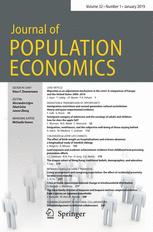The article finds that parents compensate disadvantaged children with greater cognitive resources using data from primary school-aged Ethiopian siblings.
Read more in:
Wei Fan & Catherine Porter
Reinforcement or compensation? Parental responses to children’s revealed human capital levels, forthcoming Journal of Population Economics, Vol. 33 (2020), online first. Open Access.
Author Abstract: A small but increasing body of literature finds that parents invest in their children unequally. However, the evidence is contradictory, and providing convincing causal evidence of the effect of child ability on parental investment in a low-income context is challenging. This paper examines how parents respond to the differing abilities of primary school-aged Ethiopian siblings, using rainfall shocks during the critical developmental period between pregnancy and the first 3 years of a child’s life to isolate exogenous variations in child ability within the household, observed at a later stage than birth. The results show that on average parents attempt to compensate disadvantaged children through increased cognitive investment. The effect is significant, but small in magnitude: parents provide about 3.9% of a standard deviation more in educational fees to the lower-ability child in the observed pair. We provide suggestive evidence that families with educated mothers, smaller household size and higher wealth compensate with greater cognitive resources for a lower-ability child.
Read also the Lead Article of issue 4 (2019):
Gautam Hazarika, Chandan Kumar & Sudipta Sarangi:
“Ancestral ecological endowments and missing women“
Journal of Population Economics, Vol. 32 (2019), Issue 4 (October), pp. 1101-1123
Journal Website, complete issue 4. Paper PDF – OPEN ACCESS.
GLO Fellows Gautam Hazarika, Chandan Kumar Jha & Sudipta Sarangi

Ends;

